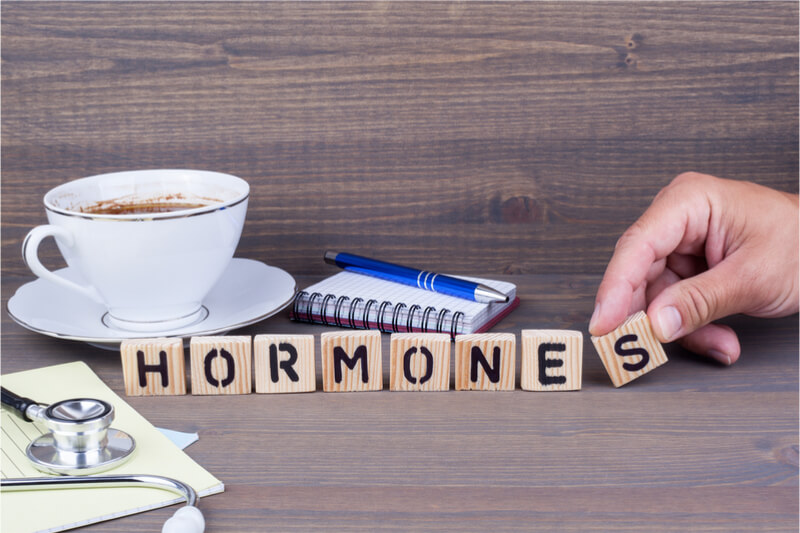One of the biggest sources of misinformation about the keto diet has to do with ketosis and hormone imbalance. But here’s the truth: ketosis does not cause hormonal issues. A correctly followed and monitored keto diet can actually have benefits for hormonal health.
Here’s how ketosis and hormone imbalance are linked and what to know about them when following the Keto Zone Diet.
Myths About Ketosis and Hormone Imbalance
There’s a lot to know when it comes to beliefs about ketosis and hormone imbalance. It’s true that what you eat can affect your hormones, but that doesn’t mean it’s always a bad thing. Let’s look at the facts.
The Keto Diet, Thyroid Health, and T3
The most common myth regarding ketosis and hormone imbalance is that eating a ketogenic diet is bad for your thyroid. Let’s look at why this isn’t the case:
Thyroid stimulating hormone (TSH), which is secreted by your pituitary gland, stimulates your thyroid to make the hormone thyroxine (T4). T4 converts to triiodothyronine (T3). Hypothyroidism, a disorder where the thyroid doesn’t make enough hormones, is usually diagnosed due to high TSH and low T4.
But eating a keto diet has been associated with lower levels of T3, not T4. Plus:
- Weight loss itself can lower thyroid activity—no matter the diet. Weight loss decreases T4 conversion into T3, so levels can be lower simply from losing weight [1]. And as we know, there are many benefits of weight loss.
- Since more T3 is needed to metabolize carbs, someone on a low-carb diet could have lower T3 levels, but they wouldn’t need more because they aren’t burning extra glucose. In other words, following a ketogenic diet may actually improve thyroid hormone sensitivity and decrease its burden.
- Plus, the longest-living humans are often genetically predisposed to having lower T3 levels, meaning it may not be a flaw as it’s described [2].
So, when a keto diet is done right, it may actually help support normal thyroid functioning. That being said, if you have a medical condition hypothyroidism, it’s best to consult with your doctor.
Keto and the HPA Axis
Another concern is that the ketogenic diet can upset communication to the hypothalamic, pituitary, adrenal (HPA) axis—our main stress response system—causing problems.
However, there is no evidence that ketosis affects the HPA axis [3]. What we do know is that ketones use a different pathway that might be even more efficient [3].
Plus, ketosis has been shown to have little or no effect on cortisol (stress hormone) levels [4, 5].
Hormonal Benefits of Ketosis
As is covered in the Keto Zone Diet book, keto is truly great for balancing the hormones ghrelin and leptin. (Ghrelin increases your hunger, while leptin decreases it. )
When these hormones are imbalanced, as they often are when you’re overweight, eating a poor diet, and/or get older, your appetite signals are all off and it leads to more weight gain.
Unlike other diets, the Keto Zone Diet helps to balance these appetite hormones and prevent them from sabotaging your health and weight loss plans. Plus, the abundance of healthy fats, including omega-3s, slows digestion time so you feel fuller and satisfied longer.
We’ve also seen many people starting keto specifically to address hormonal imbalances—whether that’s for menopause problems, hormonal acne, or conditions like endometriosis or PCOS [6]. Many anecdotal accounts also report relief from symptoms after getting into the Keto Zone.
Ways to Balance Hormones on the Keto Diet
As we’ve covered, a keto diet and ketosis don’t directly cause hormonal imbalance. If you do have hormonal imbalance, the first step is finding a doctor who will take it seriously. They can help you get bloodwork done to see anything that needs to be addressed.
Along with that, other ways to naturally support balanced hormones on the Keto Zone Diet include:
- Make sure you’re in the Keto Zone: A low-carb diet and being in ketosis are two different things. Make sure you’re actually in ketosis, at least during the beginning of your diet, to ensure you get the most benefit. Keto flu, the transition period to ketosis, can make you feel off temporarily and make it hard to monitor other symptoms.
- Be sure you’re eating enough, as too little calories may impact the thyroid.
- Focus on more monounsaturated (MUFA) and saturated fats (SF) versus polyunsaturated fats (PUFA), as one type of PUFA may negatively affect the thyroid.
- Lower your physical and mental stress: Overtraining or too much psychological stress can increase levels of reverse T3, which negatively affects the thyroid.
- See these additional tips for balancing hormones naturally.
Sources:
- https://www.ncbi.nlm.nih.gov/pubmed/23902316
- https://www.ncbi.nlm.nih.gov/pubmed/20739380
- https://pdfs.semanticscholar.org/b505/80ad83fcbf977b3eef9bd90920880b209312.pdf
- https://actavetscand.biomedcentral.com/articles/10.1186/1751-0147-52-31
- http://diabetes.diabetesjournals.org/content/24/3/301.short
- https://www.ncbi.nlm.nih.gov/pmc/articles/PMC1334192/
More Articles From Drcolbert.com Find Out More About Dr.Colbert’s Health Services

It didn’t address what you do if you have no thyroid and are controlling your hormones by pills , Levothyroxine.. thank you for your help.
Hi
I use warfarin daily because I had a stroke 12 yrs ago, will I be able to use Hormone/Thyroid caps daily? I use eye drops for glaucoma disease daily also…does that make a difference from H/T caps? thanks, [email protected]
Hi Judy,
Depending on your medical condition we highly recommend to consult your physician before taking any of these supplements.
Can a post menopausal woman age 77 take Hormone zone if not on any estrogen or progesterone?